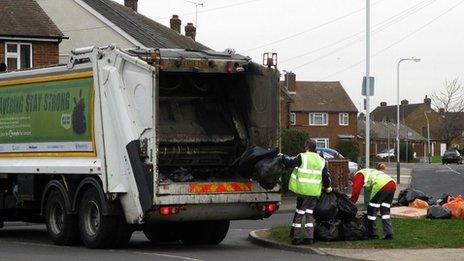Councils' spending cuts revealed
- Published

England's councils will face an average spending-power cut of 2.9% in the year 2014-15, the government has announced.
Communities minister Brandon Lewis said this would allow a settlement "fair to all parts of the country" and called for more efforts to tackle waste.
But Labour said services would suffer and some councils could be stretched to "breaking point".
Last year, authorities were told they would face an average reduction in spending power of 1.7%.
In a written statement, Mr Lewis said, external: "English local government accounts for £1 of every £4 spent on public services, and is expected to spend some £117bn in 2013-14.
"So the settlement that we are proposing recognises the responsibility of local government to find sensible savings and make better use of its resources."
Mr Lewis promised a £9.5m fund "so that the most rural local authorities can continue to drive forward efficiencies in their area".
In June's spending review, Chancellor George Osborne announced that a freeze on council tax in England, due to come to an end in April 2014, would be extended by two years.
Mr Lewis said: "We expect local authorities to protect taxpayers and help bear down on the cost of living.
"That is why we have provided up to £550m of extra funding to local authorities so they can freeze council tax for the next two years."
Mr Lewis indicated he was ready to consider lowering the 2% threshold at which a proposed rise in council tax will trigger a local referendum. The trigger point is due to be announced in the New Year following consultation.
'Biggest cuts'
In the Commons, Labour's shadow communities secretary Hilary Benn, said: "Why are the most disadvantaged communities, once again, being the hardest-hit?"
He added: "Tough times do indeed require tough decisions but, as this government has shown time and time again, from the bedroom tax to the top rate of tax to local government funding, it takes most from those who have least. It is unfair and it is unjust."
The Local Government Association, which speaks on behalf of more than 400 councils in England and Wales, said town halls were continuing to face tough times but ministers had made some important concessions to alleviate the impact of the continuing budget squeeze.
"The money government gives to councils to run local services will fall by 8.5% over the next two years, but as a result of the Autumn Statement there will not be an additional reduction on top of this," said chairman Sir Merrick Cockell.
He added: "At a time when local authorities are contending with the biggest cuts in living memory, the introduction of the Better Care Fund and government's decision to reverse potentially costly changes to the New Homes Bonus will help the efforts of some local authorities in protecting vital everyday services, like caring for the elderly, from the worst impact of spending cuts."
By 2015, Sir Merrick said, local government would have had to make £20bn in savings, adding that the next two years would be "the toughest yet" for those reliant on council services.
Graeme McDonald, director of the Society of Local Authority Chief Executives and Senior Managers, said some authorities would face cuts as high as 6.9%, which could take them "to breaking point".
He added: "This settlement reminds us that the financial challenge facing local government is immense."
Council funding elsewhere in the UK is the responsibility of the devolved institutions.
- Published18 December 2013
- Published19 December 2012
- Published19 December 2012
- Published2 July 2013
- Published20 June 2013